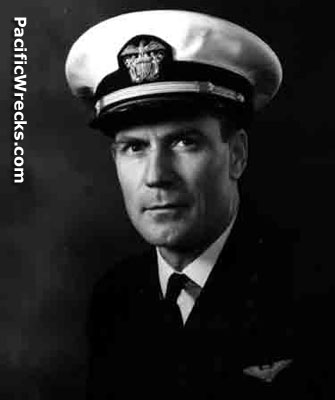Commander William Bowen Ault
SBD-3 Dauntless 4679
Search For Information
 For many years, I wondered who was the crewman
on my father's SBD Dauntless during the Battle
of the Coral Sea in May, 1942. None of the many books, articles and
documents that I had read made any reference to him by name. Who was
he? Where was he from? How old was he? What was his rank? Did he have
a family? Where does one start to look for answers and information? For many years, I wondered who was the crewman
on my father's SBD Dauntless during the Battle
of the Coral Sea in May, 1942. None of the many books, articles and
documents that I had read made any reference to him by name. Who was
he? Where was he from? How old was he? What was his rank? Did he have
a family? Where does one start to look for answers and information?
It was not until the spring of the year 2000, fifty-eight
years after the Coral Sea battle that the mystery began to unfold. Through
the wonders of the internet and e-mail, I found myself in contact with
Vincent L. Anderson, a former U.S. Marine gunner, who was aboard the
USS Lexington during the battle and survived both the battle and the
sinking of that great ship. Vince, as he is known, presently serves
as historian and Memorial Committee Chairman of the USS Lexington CV-2
Minutemen Club. It was he who informed me of the identity of the person
who flew as radioman / gunner on my father¹s plane. That individual
was ARM 1/ c William T. Butler, USN. Other than his service number,
Vince had no further information on him. He suggested that I make inquiry
with the National Personnel Records Center in St. Louis, Missouri.
I decided to enlist the help of my U.S. Senator John
W. Warner who was currently chairman of the Senate Armed Services Committee
and himself a former U.S. Navy (USN) enlisted man and U.S. Marine Corps (USMC) officer. In response
to my request, Senator Warner initiated a personal inquiry to the National
Personnel Records Center. This resulted in the official records contained
in this book which were forwarded to me through his office in Washington,
DC.
A thorough reading of the many documents reveals an
interesting sketch of William Thomas Bulter. I learned that he enlisted
in the Navy on October 1, 1935 at the age of nineteen. He hailed from
Brooklyn, New York, and was the only child of older parents. He served
on continuous active duty until his death on May 8, 1942, just eight
days shy of his twenty-sixth birthday. He was married briefly in 1941,
to a woman nine years his senior who was not legally divorced from her
previous husband. They lived together for only about ten days before
he shipped out aboard the Lexington. There were no children born to
this marriage.
In the back of the book, are a few personal, handwritten
letters from William Butler's mother to Navy officials which reveal
in emotionally poignant words her desperation, anxiety and despair,
first in seeking information and after many months, learning of the
fate of her only child. Josie and William Butler, the late middle aged
parents of William Thomas Butler, experienced the great tragedy and
profound loss that so many thousands of families came to know during
WWII. Perhaps in it¹s wake, they found some consolation in knowing
that their son performed his duty with heroic distinction in a most
worthy and vital cause.
Ault's Legacy
Ault was posthumously awarded the Purple Heart and Navy Cross:
"For extraordinary heroism as Air Group
Commander of the USS Lexington in action against Japanese forces in
the Coral Sea May 7 and May 8, 1942. Commander Ault led the air attack
in the face of severe antiaircraft barrage and heavy fighter opposition,
which resulted in the complete destruction of one enemy carrier on May
7 and major damage to another on May 8. His failure to return from the
latter encounter and his courageous conduct throughout the duration
of these actions were an inspiration to the entire air group."
Ault Field
The US Navy field at Clover Valley on Whidbey Island
was named in honor of Ault.
USS Ault
USS Ault (DD-698) was named for LCDR William Bowen
Ault, air group commander for USS Lexington (CV-2). USS AULT was laid
down at the Kearny yard, NJ of Federal Shipbuilding on November 15,
1943. Ault's widow christened the ship when launched the following March,
and commissioned two months later. The ship went through her shake down
in the Caribbean and then was transferred to the Pacific for combat
operations, where the ship joined Task Group 38.2 and interrupt enemy
bases in the South China Sea area to prevent the flow of aircraft from
bases in Formosa and Indochina from joining the battle in the Philippines.
On this mission, the ship suffered no losses aboard or her escorts.
In the winter and spring of 1945 the ship joined Task
Force 58 and bombarded Iwo Jima and Okinawa airfields. For two months,
DD-698 was under constant action against kamikaze attacks aimed at the
carriers, destroying a half dozen enemy planes and rescuing survivors
from the damaged USS Bunker Hill (CV-17).
After pulling back to San Pedro Bay, the ship had been
at sea continuously for eighty days. A month later, AULT participated
in the final sweeps of the Japanese mainland. The ship was anchored
near the USS Missouri (BB-63) to witness the formal Japanese surrender
in Tokyo Bay.
Contact
Robert Bowen Ault (son)
Glen Allen, Virginia
Contribute Information
Do you have photos or additional information to add?
|